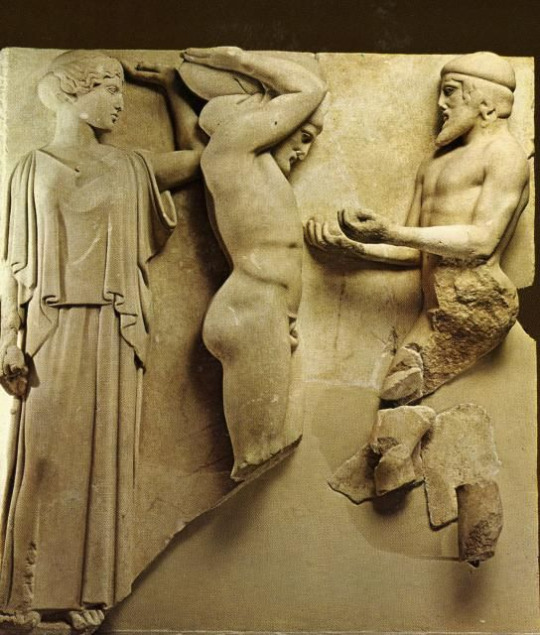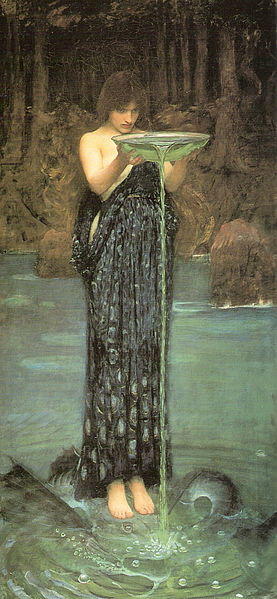#Tryphonios
Explore tagged Tumblr posts
Note
I know this was not your intention, but I am in love with the idea of historically accurate Greek vampires. I also have a random question: did the ancients have 'horror stories' (the folklore kind) like we do?
First, I too am intrigued by the concept of a vampire-ghost story. It would be interesting to explore an idea like that: the shade who doesn’t want to go back to Hades’s Hall, whether out of pity for a grieving parent (or spouse or lover), or desire to avoid the dullness of death (or both). Plenty of pathos in that scenario!
They did have horror stories. Greek myth itself is filled with horror and violence, and those stories which have come down to us began as local tales that gained wider popularity. That’s why there isn’t a (correct) version of any given Greek myth, but multiple takes. Cultures influenced by Jewish-Christian-Muslim tradition are acclimated to a “canon,” and tend to assume canons in all world religions. In fact, relatively few had them. What’s a canon? An authoritative text: e.g., the “correct” version.
Greek religion focused on what people did in terms of sacrifice, etc. (orthopraxis), not what they believed (orthodoxy).* So variations in myths didn’t flip them out. They’re more interested in the larger “sense” of the gods, and honoring particular local manifestations (usually found in epithets connected to particular stories about them).
Greek myths and legends were dynamic, belonging to a lived tradition of storytelling that was sometimes yoked to Greek religious cult, but also told at symposia (drinking parties), or as plays in the theatre, or to children in school, or by parents or nurses. And I do mean told, not read out of books. Thus, they could—and did—change over time. One of the more interesting examples of this can be seen in the “redemption” of Helen of Troy. In most early versions, she was equally guilty with Paris, choosing to run away with him, leaving her husband and daughter. But as time passed, the stories changed, suggesting she was raped, or even that she stayed in Egypt and never went to Troy. That latter was (likely) started by the lyric poet Stesichorus, then picked up by Herodotus and finally Euripides. Theatre often altered myth to tell the story a bit differently.
It’s not unlike fanfiction really.
Most myths and legends didn’t find any “fixed” form until the later Classical and Hellenistic Eras. That change owed to the rise of academic “mythographers,” in places like Alexandria, who studied myth. Also, depictions of myth in art on frequently visited buildings—such as the labors of Herakles on Zeus’s temple at Olympia—resulted in popular ossification from the Classical period. In the Archaic period and earlier, not just how the labors went varied, but even which were included in the twelve. But the construction of that temple with the labors depicted on the metopes “decided” them. (Pictured below is one of those metopes.)

That said, we still find multiple versions of stories out there. There’s no agreement on how Ariadne died—or if she died (Dionysos’s mortal wife). Aphrodite is variously the daughter of Zeus by Dione (so Homer), or the daughter of Ouranos when Kronos cut off his balls and tossed them in the Sea (so Hesiod). And myth was still changing down into the Hellenistic and Roman period. The story of Eros and Psyche is Roman, or at least Hellenistic.
So the answer to your question is that, yes, of course the Greeks had horror stories, some of which went on to become very famous, like Medusa.
There were also local stories and even shrines and oracles that qualify as horror. The Lebadaian Oracle of Tryphonios supposedly scared people so badly, some were never the same after, and a few actually died of fright. The petitioner had to be lowered down into this cave, where scary things happened (not discussed), then brought back out, and whatever one babbled on the “throne of memory” was the oracle, recorded by a priest. Talk about a “Haunted Mansion”! Or haunted cave, as it were. “To descend into the cave of Trophonios” was even a Greek saying for having the piss scared out of you.

Similarly, before it turned into a tourist attraction in the late Hellenistic and Roman Era, there was a youths rite for Artemis Ortheia in Sparta, probably involving torches and masks in the sanctuary at night. One can see why Sparta might find useful a ceremony designed to scare the bejesus out of young men, to test bravery.
The initiation rite in Dancing with the Lion at the end of Book 1 Becoming has some fear elements mystery initiations often had, meant to simulate the fear one faced at death. These mystery rites had stories attached. The murder of toddler Dionysos is pretty horrible.
Likewise, the Rape of Persephone is an ancient Blue Beard equivalent story that spoke to the fears of young women (and their mothers) before marriage. It would eventually transform into the Eleusian Rites, probably a local Thesmophoria that became panhellenic.
There are lots of stories about witches (like Circe and various Thessalian Witches), too.

If you (or others) have an interest in the darker side of Greek myth and religion, I’d recommend picking up Daniel Ogden’s Magic, Witchcraft, and Ghosts in the Greco-Roman World. It’s a reader, or sourcebook, so he gives passages from the ancient sources themselves on various topics from witches and ghosts to raising the dead (necromancy), weird oracles, etc. I use it in my Greek Myth, Religion, and Magic class. 😊 He’s also got a book on Greek and Roman Necromancy, Drakon: Dragon Myth and Serpent Cult in the Greek and Roman Worlds, and Night’s Black Agents: Witches, Wizards, and the Dead in the Ancient World. Daniel does a lot with Alexander (and Macedonia) but also writes copiously on Greek religion, especially its less publicly acceptable manifestations.
---------------------------
*This has a parallel in their attitude towards sex: what you DO, not who you do, or what you believe about your “sexual orientation,” which wasn’t even a thing. I like to point to these parallel approaches as it helps give a larger sense of Greek culture.
#horror stories in ancient Greece#Greek myth#Greek witches#Greek magic#Circe#Tryphonios#Tryphonius#mythographers#how Greek myth developed#fluidity of Greek myth#Daniel Ogden#Classics#Asks#ancient Greece#tagamemnon
18 notes
·
View notes